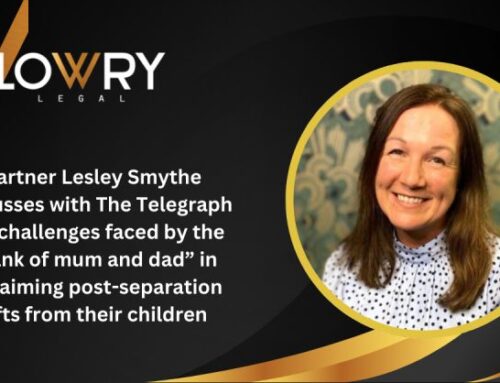
If you’re about to enter into a marriage or civil union, you might not want to over complicate matters by bringing up the ‘what ifs’. After all, this is supposed to be a period of trust, security and, most of all, happiness. While all of that is true, giving serious thought to what you can do to protect your most valuable assets doesn’t need to dampen the mood. In fact, it could make married life much easier in the long-term.
Nuptial agreements have become an increasingly popular option for couples looking to simplify and safeguard shared finances. Far from being the preserve of high net worth relationships, one in five marriages in the UK now use this promising legal safety net. Even so, for many, nuptial agreements still represent something of an unknown quantity.
‘Prenups’ are created before a marriage begins and allow a couple to state what happens if things break down. Fundamentally this legal document gives both parties greater transparency. Therefore, getting one doesn’t mean that you lack faith in the present, it means you want a better understanding of what could happen in the future.
So, how do you get a prenuptial agreement? And what benefits could they offer?
What is a Prenuptial Agreement?
A prenuptial agreement is a legal document that allows a couple to set out before marriage what happens to their assets in the event of divorce. A typical agreement will usually cover the basics of savings, properties, debts, and other income. However, in more complex circumstances it might also include intricate factors like the division of businesses, investments, and trusts.
The purpose of a prenup is to attempt to ring fence certain assets, keeping them out of the shared matrimonial pot. As an example of a prenup in action, Partner A is expecting to inherit a significant sum of money from an ill relative within months of marriage. They agree with Partner B that they can’t make any claims on the inheritance if the relationship ends and this is included in the agreement.
Do I Need a Lawyer For a Prenuptial Agreement?
It would be a mistake to assume that you could draft your own prenuptial agreement, as certain requirements must be met in order for it to carry as much legal weight as possible. Essentially, the agreement will need to be both fair and transparent, timely, and with prior legal advice from comparable lawyers on both sides being the ideal. This will ensure that your future best interests are taken care of.
Experienced nuptial agreement solicitors are much more likely to consider the potential pitfalls that could have serious repercussions down the line. These include the mechanism for reviewing the agreement over time, what happens if financial circumstances change, and if having children would change the terms. Ultimately, every relationship is different, so the advice you receive should be tailored to your situation.
Do Prenuptials Hold Up in Court?
Although prenuptial agreements are not technically legally-binding in England and Wales, the courts are increasingly likely to refer to them during decision making. However, the agreement itself must be regarded as being fair to both parties in order for it to be enforced. Even then, this will not supersede the need for financial parity or the welfare of children.
If you’re wondering how do you get a prenuptial agreement, you will need to ensure that it:
- Was entered into willingly by both parties. Any attempts at coercion will limit — or even undo — its effectiveness.
- Contains a signed statement showing that both parties understand its purpose and financial implications for the future.
- Was made at least 28 days before the marriage or civil union began. This is to ensure that neither party is seen as being under undue pressure to sign the agreement before the ceremony takes place.
- Was entered into with both spouses having fully disclosed their finances. If any attempts to hide assets are uncovered, not only will the agreement lose weight but it could lead to serious repercussions.
- Was agreed with both parties having obtained comparable legal advice from experts.
- Doesn’t affect the welfare of children.
- Is fair overall to both parties.
How Do You Get a Prenuptial Agreement?
For anyone wondering, “How do you get a prenuptial agreement?”, speaking with a solicitor should be your first port of call. You will need to provide a comprehensive overview of your finances, from any assets you own, to your potential financial needs in the event of separation. This includes requirements relating to any children or dependents.
Before your initial consultation, you are encouraged to prepare by thinking about the following questions:
- What assets do I own?
- What assets does my partner own?
- If the relationship was to end, what would my financial needs be?
- What are the financial needs of any children I’m bringing into the relationship? Is this likely to change in the future? How would this be affected by divorce?
Once you’ve clarified and answered these questions in the agreement, your nuptial agreement solicitors will make a draft document. Your partner’s legal team will need to thoroughly review the contents and may suggest that amendments are made. Once both parties are satisfied with the agreement, it can then be signed.
And Why You Should Have One…
There are some popular misconceptions around prenuptial agreements. For some, they are the preserve of the rich and famous, only being of use for relationships that contain yachts, penthouses and private jets. For others, they’re seen as being more likely to cause rifts than solve anything.
In reality, prenups can be an invaluable form of insurance for any couple, helping to foster a sense of openness and trust that can benefit the dynamic for years to come.
The question, ‘how do you get a prenuptial agreement?’ is perhaps matched in importance by the reasons to draft one. The main benefits are:
- Safeguarding For Your Most Valuable Assets: A nuptial agreement can clearly outline who gets to keep what, which is especially useful if only one spouse came into the relationship with valuable possessions, such as family heirlooms or significant personal wealth. This might also be of benefit if you provide for children from a past relationship and want to ensure that they get their fair share of an inheritance in the future.
- Protection From Someone Else’s Liabilities: On the flipside, if you or your partner have personal debts, a prenup could ensure that they don’t become the other party’s responsibility post-divorce or civil dissolution.
- Reduces the Stress and Expense of Divorce Process: Having to negotiate the division of assets is usually one of the most stressful and time-consuming features of any divorce. However, if you have already determined the financial outcomes, you can generally expect a much more predictable and efficient process.
- Creates a More Open Atmosphere: These agreements can create a more transparent dynamic, opening up conversations that are much better being addressed rather than avoided. Far from damaging a relationship, being open could actually reduce conflict and improve feelings of trust.
Cover Everything With Lowry Legal
The beginning of a marriage or civil union is an exciting time that encourages you to look to the future with optimism. However, it’s also important to take practical steps that could protect your most cherished possessions and safeguard everything that matters most. That’s why it can be so crucial to receive comprehensive guidance from pre and post nuptial agreement solicitors you can trust to cover every last detail.
Lowry Legal is a family solicitor with a wealth of experience in high net worth divorce cases. We’ve helped clients to do everything possible to protect extremely valuable assets, including businesses, pensions, trusts, and other significant investments. A member of the Legal 500, we offer a holistic service that meets your objectives by focusing on the intricacies of your relationship and devising the most suitable approach possible.
An expert in family law, we can help with anything from divorce and separation, to finances, cohabitation disputes, and more. Everything we do is informed by our determination to be transparent, holistic and geared around your needs. This all-encompassing service helps us to get to the bottom of what matters to you most and simplifies your path to a positive resolution.
For more information about what our dedicated team can do for you, get in touch today.










